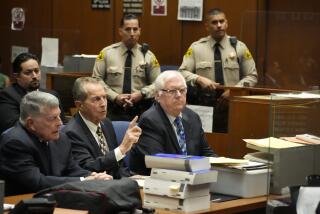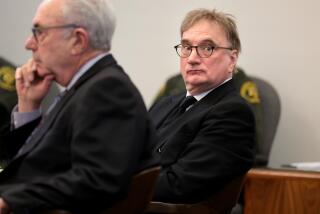In third trial, man convicted of murdering wife
Bea Hurd wanted a divorce.
The 46-year-old mother of two told friends that her husband, an economist at an accounting firm, was abusive. She confided in her mother that the violence was increasing, that living with her husband was “like living in an armed camp.”
Hurd moved out and served divorce papers on her husband. Less than three weeks later, she lay crumpled on the floor of the couple’s Culver City home, bleeding from the wound where a single gunshot had pierced her heart.
Exactly what led to Hurd’s fatal shooting on the morning of April 17, 1993, has been the center of a legal saga that has endured for nearly two decades.
Prosecutors accused Dale Hurd of luring his wife to their bedroom, where he deliberately shot her to prevent her from taking thousands of dollars in monthly spousal and child support. Dale Hurd described the shooting as a terrible accident, saying his gun malfunctioned as he tried to show it to his wife.
The first jury deadlocked on whether he committed murder. A second, in 1995, convicted him. Two years ago, however, a federal appeals court overturned the conviction, concluding that prosecutors should not have been allowed to tell jurors that Hurd refused to reenact the shooting for police.
A downtown Los Angeles jury on Thursday ended the latest chapter in the long-running case, convicting Hurd, now 62, of murdering his wife for financial gain after a third trial. Hurd, wearing glasses and a dark blue suit, showed no emotion as the verdict was read.
“The defense … didn’t add up,” jury foreman Richard Lynch, an accountant, said after the verdict. “His claims were too far-fetched to believe.”
During closing arguments in the trial earlier this week, defense attorney Jeffrey Brodey told jurors that his client had been unfairly portrayed by his wife before her death. Brodey noted that Bea Hurd had started an affair with a friend of her husband’s. The attorney argued that the victim told friends and others that Dale Hurd was abusive in an effort to help her case in divorce court.
“She painted him worse than he was,” Brodey told jurors.
The shooting occurred the same day that a federal jury announced its verdicts in the trial of four Los Angeles police officers accused of violating Rodney G. King’s civil rights. Many local residents were concerned that the verdicts would set off the sort of rioting that was sparked the year before when a Simi Valley jury had acquitted the officers of beating King.
Dale Hurd testified that he and his wife were in their bedroom while the federal jury’s verdict was on the television when he tried to show her how to use a gun to protect herself, and the pistol accidentally discharged.
But Deputy Dist. Atty. Danette Meyers argued that Hurd murdered his wife when she refused to sign legal papers that would have given her only $1,000 a month in child support, much less than a judge would likely have awarded her based on her husband’s $101,000-a-year income from the accounting firm Coopers & Lybrand. The shooting occurred 13 days before a judge was scheduled to make a temporary order on support and custody in the divorce case.
“It didn’t happen because the defendant decided to brutally eliminate ... his soon-to-be-former wife,” Meyers told jurors.
On the morning of the shooting, Bea Hurd went to the family’s home, where her husband still lived, to pick up their two children, whom she had dropped off the day before. Charlie, then 4, heard a gunshot and watched his mother stumble down the stairs and collapse, Meyers told jurors. The prosecutor said the boy later told police that “Daddy shot Mommy. Mommy wouldn’t sign the papers.”
The shot was fired from a distance of one to six inches, at an angle consistent with Bea Hurd sitting or kneeling, Meyers said. The prosecutor noted that Dale Hurd claimed his wife was standing in front of the bedroom’s television set when the gun accidentally went off.
Meyers said Dale Hurd followed his wife down the stairs but did not stop to help her. Instead, he picked up his son, carried him to a vehicle outside where his 7-year-old daughter was waiting, put the boy in the back seat, returned to the house and only then called 911.
“Accident? I think not,” Meyers told jurors.
Meyers noted that one of Dale Hurd’s co-workers, a former Culver City police officer, testified that Hurd told him weeks before the shooting that his wife had left him and asked whether he knew anyone who “could take her out.” Numerous friends of Bea Hurd’s testified that she was terrified of guns, making it unlikely that she would want her husband to show her a firearm, Meyers argued.
Lynch, the jury foreman, said the panel was convinced that Bea Hurd was, indeed, a victim of domestic violence. Jurors, he said, were also struck by testimony from a work colleague who said that Dale Hurd asked a day before the killing about hollow point bullets and how loud guns are when they are discharged. The bullet used in the shooting was a hollow point.
“It was just too hard for us to disregard,” Lynch, 28, said.
He said the panel believed that Dale Hurd was motivated by financial interests but also by the fact that his wife was having an affair with a friend and that he was losing his family. Dale Hurd did not express concern for his wife during his testimony, Lynch said.
“Nobody found him to be a credible witness,” the juror said.
More to Read
Sign up for Essential California
The most important California stories and recommendations in your inbox every morning.
You may occasionally receive promotional content from the Los Angeles Times.











